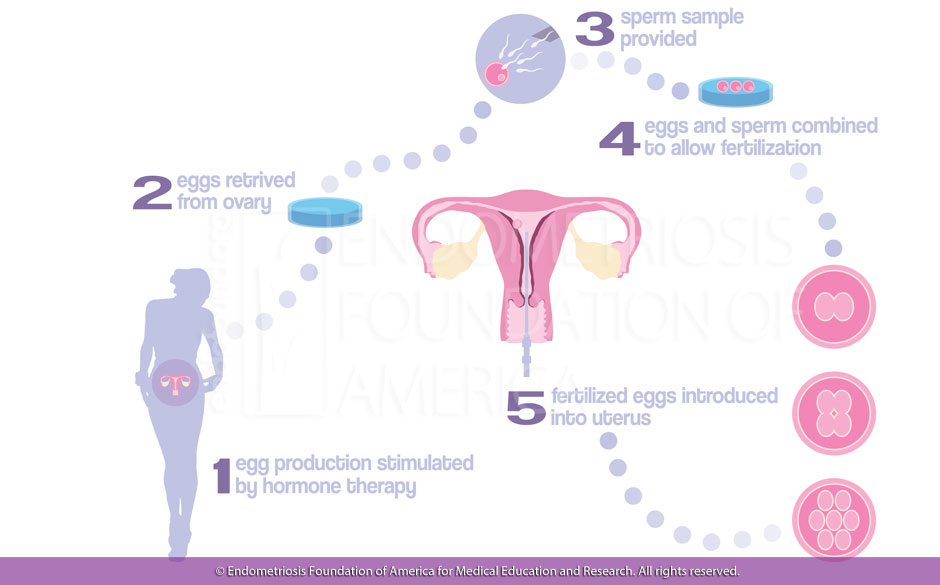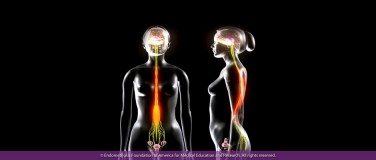
Infertility as a symptom of endometriosis
Fertility problems are highly associated with endometriosis, and it is thus the sixth fundamental symptom of the disease. Infertility is often defined as the inability to conceive a child. However, in endometriosis cases infertility can also take the form of not being able to carry a pregnancy to full term, often suffering miscarriages.
The prominence of infertility in endometriosis patients
While endometriosis does not directly cause infertility, patients who have the disease will have a significantly lower chance of getting pregnant. The American Society for Reproductive Medicine states that endometriosis can be found in up to 50 percent of infertile women and patients with endometriosis typically suffer from infertility in about 30 to 50 percent of cases.
How does endometriosis cause fertility issues?
While the exact etiology of endometriosis is unknown, there are several reasons that can be put forth connecting the disease to infertility cases. The first reason concerns the unfriendly molecules produced by the inflammation of endometriosis. These molecules (cytokines) have a paralyzing effect on the sperm and the egg and prevent the fertilization process. The second reason is that endometriosis physically distorts the pelvic anatomy. Again, the inflammatory process changes the fine transparent texture of the peritoneum. It produces scarring and adhesions, which can cause the fallopian tubes and ovaries to become blocked, preventing the sperm and egg from coming into contact with each other. Further, the ovaries may fail to ovulate, causing eggs to become trapped in the ovaries. These obstacles in the female reproductive system can prevent pregnancy or cause very complicated pregnancies, including miscarriages.
Ways to overcome infertility due to endometriosis
While endometriosis can, and often does, prevent pregnancy, by treating the endometriosis itself, patients find that their infertility symptoms can improve. Even those with stage III or IV endometriosis find differing results following deep-excision surgery. This is because abnormal endometriosis tissue is removed and pelvic organs are restored to their normal state following a successful excision surgery. Although no doctor can guarantee that deep-excision surgery will definitely be a success, pairing it with any of the following assisted reproductive technologies (ART), can give the hope of bearing children.
-
In vitro fertilization (IVF): This is perhaps the most common form ART, in which eggs are collected and fertilized by sperm in a lab, then implanted in the uterus.
-
Intrauterine insemination (IUI): This method injects a healthy sperm cell directly into the uterus in order to ensure implantation with proper timing during the menstrual cycle.
-
Third-party assisted ART: These third-party ART techniques are used either by themselves or in congruence with other ART methods. This can include, egg and sperm donation or surrogate or a gestational carrier. The former is used when it is not possible to produce healthy eggs, while the latter is used when the individual cannot carry a pregnancy.

Silent endometriosis
Many times, a patient who has difficulty conceiving will have a case of endometriosis that does not come with severe symptoms. This is known as silent endometriosis. These silent sufferers eagerly crowd into the waiting rooms of in vitro fertilization (IVF) clinics and reproductive specialists with the hope of conceiving. However, these individuals are often not told they may have endometriosis, and the in vitro attempts they take will generally fail. If these patients question the possibility of endometriosis as the cause for the failure, they are usually falsely assured by their fertility specialist that endometriosis does not have a negative, or even significant, impact on conception. Sometimes, physicians will even claim that pregnancy will cure a patient's endometriosis. By the time multiple IVF attempts have failed, these patients be told that their ovaries have no reserves left and that egg quality is poor. But when endometriosis is removed by excision surgery, inflammatory tissue from the ovary and around the fallopian tubes is also removed. As a result, patients may not only increase their rate of success with IVF but also, not infrequently, get pregnant naturally without assisted technologies.
Patients with endometriosis cannot have children.
Although endometriosis is a leading cause of infertility, many patients are able to get pregnant after quality excision surgery and/or with the use of reproductive technology. There are many factors that influence the ability to get pregnant and carry a pregnancy to term.
A note on hysterectomies
Many physicians, especially in regards to infertility cases, will assume a hysterectomy is a proper treatment for endometriosis. They will see a history of miscarriages, stillbirths, and other fertility issues and simply assume the patient is infertile. At this stage, it is important to remember that hope is not lost. If an aspiring parent is having difficulty becoming pregnant or delivering a child and there is a suspicion of endometriosis due to other symptoms, then they should certainly consider endometriosis treatment options, particularly excision surgery, as a way to improve their chances of conceiving. Many patients suffering from endometriosis have found success through reproductive technology or excision surgery, or a combination of both. A hysterectomy should only be conducted as a last resort, with the patient's knowing consent that if conducted, they will no longer have any chance of becoming pregnant.
References
-
A. Daniilidis and G pados. “Comments on the ESHRE recommendations for the treatment of minimal endometriosis in infertile women.” Reproductive Biomed Online, Pubmed.gov, National Institute of Health (NIH). Oct 23, 2017. https://www.endonews.com/treatment-of-minimal-endometriosis-in-infertile-women
-
Carlo Bulletti et al., “Endometriosis and infertility.” Journal of Assisted Reproduction and Genetics. August 27th, 2011, p: 441-447.
- Dr.Seckin .com - Endometriosis and infertility









